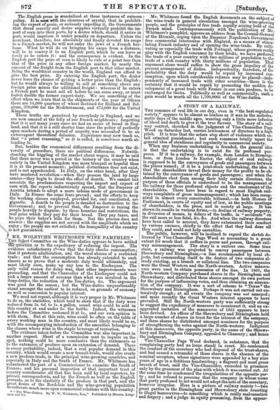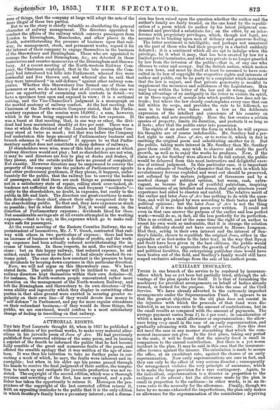A STORY OF A RAILWAY.
Tan romance of real life in our day, even in "the best-regulated society," appears to be almost as lawless as it was in the melodra- matic clays of the middle ages, wanting only a little more infusion of blood and death to give it the true flavour. The story of a rail- way contest, sketched in the judgment of Vice-Chancellor Page Wood on Saturday last, carries lawlessness of directors to a high pitch. It is true that the actors stop short of violences which en- tail criminal punishment; but such romances totally upset the general idea of steadiness and regularity- in commercial society. When any business undertaking is founded, the general idea
is that the undertaking is to exist for its professed pur- poses. If it be a railway, for example, from London to Birming- ham, or from London to Exeter, the object of said railway is supposed to be the conveyance of goods and passengers between the places named; if it be a joint-stock undertaking, the idea is that the shareholders invest their money for the profits to be ob- tained by the conveyance of goods and passengers ; and when the shareholders elect from among their body certain directors, the purpose of these officials is understood to be the management of the railway for those professed objects and the emolument of the shareholders. There -have been in regard to most English rail- ways complaints of gross mismanagement ; which has been recog- nized in almost every conceivable tribunal,—in both Houses of Parliament, in courts of equity and of law, at the public meetings of shareholders, in the press, and in society at large. It has shown its results in various forms,—in decline of railway property, in diversion of means, in delays of the traffic, in "accidents" on the rail more or less fatal, &c. &a And when the railway directors have been called to account, they have extenuated their conduct by various excuses chiefly to the effect that they had done all they could, and could not help casualties.
The public, however, will be inclined to regard the sketch de-
livered by Vice-Chancellor Page Wood as accounting to a great extent for much that it suffers in purse and person, through rail- way mismanagement. The story is a curious one. Some time since, a railway was projected to convey passengers between Shrewsbury and Birmingham,—a line recommended by local ob- jects, but commending itself to the desires of two companies al- ready existing, as a branch or collateral line. The two companies were the Great Western and the North-western. Active mancen- vres were used to obtain possession of the line. In 1851, the North-western Company purchased shares in the Birmingham and Shrewsbury, and distributed these shares amongst its own porters for the purpose of influencing votes, and thus obtaining an annexa- tion of the company. It was a sort of scheme to "Texas" the Shrewsbury and Birmingham. Perhaps it was not carried out ex- tensively enough ; at all events the company was not annexed ; and more recently the Great Western interest appears to have prevailed. Still the North-western party was sufficiently strong to suggest the expediency of measures to counteract it, and an ex- aggerated imitation of the manceuvre of 1851 appears to have been devised. An officer of the Shrewsbury and Birmingham held a large number of shares in trust for the interest of the company, and those shares he distributed amongst nominees for the purpose of strengthening the votes against the North-western. Indignant at this manceuvre, the opposite party, in the name of the Shrews- burT and Birmingham Company, appealed to Chancery; and hence the ju.dgment.
Tice-Chancellor Page Wood declared, in substance, that the complaining party had no locus standi in court. He condemned the conduct of the secretary who had disposed of the trust-shares, and had caused a retransfer of those shares in the absence of the nominal acceptors, whose signatures were appended by a boy nine years of age in a fictitious handwriting; a flagrant and most gross breach of trust, said the Vice-Chancellor, exceeded in grossness only by the grossness of the plan with which it was carried out. At the same time he condemned the irregularities of the opposite par- ty • and he refused to presume that the company in whose name Una party professed to act would not adopt the acts of the secretary,
irregular. rregular. Here is a picture of railway society !—two great parties in the Birmingham and Shrewsbury state resorting to illegal Inancenvres—to something which is really malversation and forgery ; and a judge in equity presuming, from the appear-
anoe of things, that the company at large will adopt the acts of the more illegal of those two parties.
But to us the story is chiefly valuable as elucidating the general character of railway management. The directors appointed to conduct the affairs of the railway which conveys passengers from London to Birmingham' Manchester, and other places in the North, notwithstanding the pressure of business upon that rail- way, its management, stock, and permanent works, regard it for the interest of their company to engage themselves in the business of the Shrewsbury and Birmingham. Those who are appointed to manage the London and Birmingham, &c., are detected in those mancenvres and counter-raanceuvres of the Birmingham and Shrews- bury. At a recent meeting of the North-western Railway Com- pany, the Chairman explained, that in the late session the Com- pany had introduced ten bills into Parliament, whereof five were suocessful and five thrown out, and whereof also he said that they were introduced "in self-defence" against other railway com- panies. Whether this Shrewsbury line formed one of those ten measures or not, we do not know; but at all events, in this case we have an opportunity of examining such contests in detail—we have a specimen torn open and exposed to view; it is a sectional cutting, and the Vice-Chancellor's judgment is a monograph on the morbid anatomy of railway contest. At the last meeting, the Chairman of the North-western Company stated, that the Parlia- mental, expenses of the session were 10,0001.; a sum, however, which is far from being supposed to cover the law expenses. It was a boast at that meeting, that, in one way or other, the divi- dend had been maintained steadily at five per cent. There was a time at which the dividend of the London and Birmingham Com- pany stood at twice as much ; but that was before the Company had undertaken this large amount of Parliamentary business and branch schemes in "self-defence." It appears to us that Parlia- mentary conflict does not constitute a cheap defence of railways. If shareholders were wise, wars of this kind are a game at which railway directors would not play ; but as shareholders are not wise, it may be said directors are free to play at ducks and drakes, if they please, and the outside public have no ground of complaint. Not exactly. However directors may be empowered to convey the property of the company into the pockets of Parliamentary agents and. other professional gentlemen, if they please, it happens, unfor- tunately for the public, that the railway has to convey the bodies of passengers, and that there are such things as permanent ways not in a satisfactory state of repair, rolling stock over-tasked, at- tendenee not sufficient for the duties, and frequent "accidents "— costly to the shareholders, no doubt, in expenses, but costly to the public in life and limb. The directors use great exertions to main- tain dividends—their chief, almost their only recognized duty to the shareholding public. To that end, they save expenses as much as-possible ; but in what direction ? Not, it would seem, in the direction of Parliamentary expenses ; dividends bleed for those. But considerable savings are at all events attempted in the working expenses,—that is to say, in the expenses which go to make rail- ways safe for passengers. At the recent meeting of the Eastern Counties Railway, the su- perintendent of locomotives, Mr. J. V. Gooch, contrasted that rail- way with others in two particulars of expense : there had been an increase of business without a decline of profits, and the work- ing expenses had been actually reduced notwithstanding the in- crease of business. In these respects, he said, the railway stood alone : but on this happy railway, that reduced expense, he ad- mitted, could be carried no further ; it had already reached its ex- treme point. The case shows how constant is the pressure to keep up dividends by keeping down expenses in this particular direction. Now, we will not argue on this Shrewsbury case. We have stated Lets. The public perhaps will be inclined to say, that if railway directors kept themselves within their own domains—if, for instance, the North-western people concentrated rather more attention on the management of the North-western Railway, and left the Birmingham and Shrewsbury to its own directors—if the same ability and ingenuity which they display in outwitting other parties in that alien ground were exerted in securing greater re- gularity on. their own line—if they would devote less money to " self-defence " in Parliament, and pay for more regular attendance on their redundant business,—if they would do these things the public, we are convinced, would confess to a most satisfactory change of feeling in travelling on that railway.



























 Previous page
Previous page